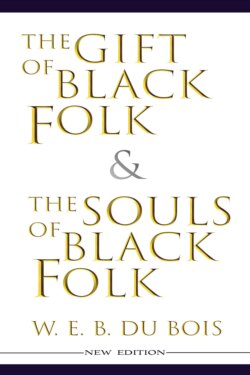Читать книгу The Gift of Black Folk & The Souls of Black Folk (New Edition) - W. E. B. Du Bois - Страница 16
На сайте Литреса книга снята с продажи.
7. The World War
ОглавлениеFinally we come to the World War, the history of which is not yet written. At first and until the United States entered the war, the Negro figured as a laborer and a great exodus took place from the South as we have already noted. Some effort was made to keep the Negro from the draft, but finally he was called—and although constituting less than a tenth of the population he furnished 13% of the soldiers called to the colors. The registry for the draft had insulting color discriminations and determined effort was made to confine Negroes to stevedore and labor regiments under white officers. Most of the Negro draftees were thus sent to the Service of Supplies, where they were largely under illiterate whites and suffered greatly. Finally a camp for training Negro officers was established and nearly 700 Negroes com missioned, none of them, however, above the rank of captain; Charles Young, the highest ranking Negro graduate of West Point and one of the best officers in the army was kept from the front, because being already a colonel with a distinguished record he would surely have become a general if sent to France.
Two Negro divisions were planned, the 92nd and the 93rd. The 93rd was to be composed of the Negro National Guard regiments all of whom had some and one all Negro officers. The latter division was never organized as a complete division, but four of its regiments were sent to France and encountered bitter discrimination from the Americans on account of their Negro officers. They were eventually brigaded with the French and saw some of the hardest fighting of the war in the final drive toward Sedan. They were cited in General Orders as follows by General Goybet:66
“In transmitting to you with legitimate pride the thanks and congratulations of the General Garnier Duplessis, allow me, my dear friends of all ranks, Americans and French, to thank you from the bottom of my heart as a chief and a soldier for the expression of gratitude for the glory which you have lent our good 157th Division. I had full confidence in you but you have surpassed my hopes.
“During these nine days of hard fighting you have progressed nine kilometers through powerful organized defenses, taken nearly 600 prisoners, 15 guns of different calibers, 20 minnewerfers, and nearly 150 machine guns, secured an enormous amount of engineering material, an important supply of artillery ammunition, brought down by your fire three enemy aeroplanes.
“Your troops have been admirable in their attack. You must be proud of the courage of your officers and men; and I consider it an honor to have them under my command.
“The bravery and dash of your regiment won the admiration of the 2nd Moroccan Division who are them selves versed in warfare. Thanks to you, during those hard days, the Division was at all times in advance of all other divisions of the Army Corps. I am sending you all my thanks and beg you to transmit them to your subordinates.
“I called on your wounded. Their morale is higher than any praise.
—Goybet. ”
The 92nd Division encountered difficulties in organization and was never assembled as a Division until it arrived in France. There it was finally gotten in shape and took a small part in the Argonne offensive and in the fight just preceding the armistice. Their Commanding General said:
“Five months ago today the 92nd Division landed in France.
“After seven weeks of training, it took over a sector in the front line, and since that time some portion of the Division has been practically continuously under fire.
“It participated in the last battle of the war with creditable success, continuously pressing the attack against highly organized defensive works. It advanced successfully on the first day of the battle, attaining its objectives and capturing prisoners. This in the face of determined opposition by an alert enemy, and against rifle, machine-gun and artillery fire. The issue of the second day’s battle was rendered indecisive by the order to cease firing at eleven A. M.—when the armistice became effective.”67
With the small chance thus afforded, Negro troops nevertheless made a splendid record and especially those under Negro officers. If they had had larger opportunity and less organized prejudice they would have done much more. Perhaps their greatest credit is from the fact that they withstood so bravely and uncomplainingly the bar rage of hatred and offensive prejudice aimed against them. The young Negro officers especially made a splendid record as to thinking, guiding leaders of an oppressed group.
Thus has the black man defended America from the beginning to the World War. To him our in dependence from Europe and slavery is in no small degree due.
—————
